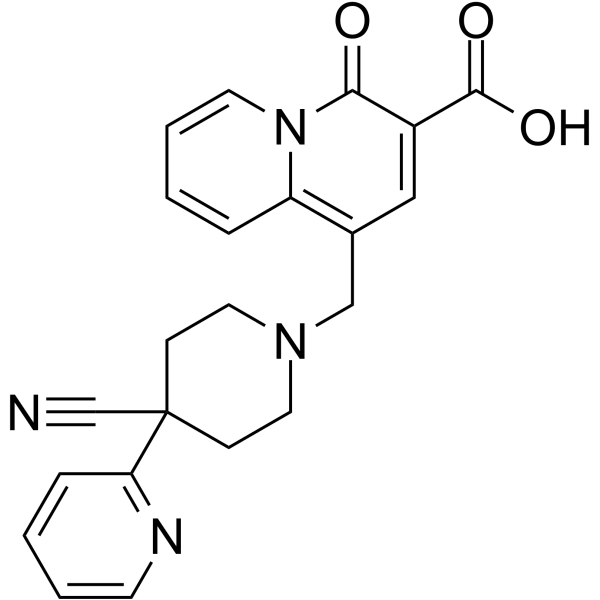All AbMole products are for research use only, cannot be used for human consumption.

For this product's availability, delivery time and price, please email [email protected] directly or click the "Inquiry Now" button below.
PQCA is a highly selective and potent muscarinic M1 receptor positive allosteric modulator. PQCA has an EC50 value of 49 nM and 135 nM on rhesus and human M1 receptor, respectively. PQCA is inactive for other muscarinic receptors. PQCA has potential to reduce the cognitive deficits associated with Alzheimer's disease.
| Molecular Weight | 388.42 |
| Formula | C22H20N4O3 |
| CAS Number | 1144504-35-7 |
| Form | Solid |
| Solubility (25°C) | DMSO 10 mg/mL (ultrasonic and warming and heat to 60°C) |
| Storage |
Powder -20°C 3 years ; 4°C 2 years In solvent -80°C 6 months ; -20°C 1 month |
| Related AChR/AChE Products |
|---|
| Methoctramine tetrahydrochloride
Methoctramine tetrahydrochloride is a potent and cardioselectivity antagonist of M2 muscarinic receptor. |
| AT 1001
AT 1001 is a high-affinity and selective antagonist of the α3β4 nicotinic acetylcholine receptor (α3β4 nAChR) with Ki of 2.64 nM. |
| Dihydro-β-erythroidine hydrobromide
Dihydro-β-erythroidine hydrobromide is a potent, orally active, and competitive antagonist of neuronal nAChRs. Dihydro-β-erythroidine hydrobromide shows selectivity for α4β4 and α4β2 nAChRs, with IC50s of 0.19 and 0.37 μM, respectively. |
| Spinosad
Spinosad, a mixture of spinosyns A and D known as fermentation products of a soil actinomycete (Saccharopolyspora spinosa), is a biological neurotoxic insecticide with a broader action spectrum. Spinosad targets the nicotinic acetylcholine receptor (nAChRs) of the insect nervous system. |
| TAE-1
TAE-1 is a potent inhibitor of AChE and BuChE. |
All AbMole products are for research use only, cannot be used for human consumption or veterinary use. We do not provide products or services to individuals. Please comply with the intended use and do not use AbMole products for any other purpose.


Products are for research use only. Not for human use. We do not sell to patients.
© Copyright 2010-2024 AbMole BioScience. All Rights Reserved.
